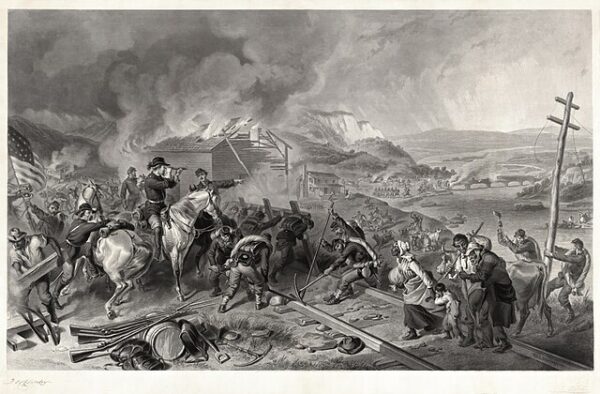The Battle of Atlanta, fought on July 22, 1864, during the American Civil War, was a significant engagement in the Atlanta Campaign. It pitted Union forces led by Major General William T. Sherman against Confederate troops commanded by General John Bell Hood. This battle was part of Sherman’s broader strategy to capture the vital railroad and supply hub of Atlanta, Georgia, which was crucial for the Confederacy’s war effort.
The campaign began in May 1864, with Sherman’s armies advancing from Chattanooga, Tennessee, towards Atlanta. Over several months, Union forces engaged in a series of battles and maneuvers, steadily pushing Confederate troops back. By mid-July, Sherman’s forces were positioned just outside Atlanta, ready to launch their final assaults.
On July 20, 1864, Hood, who had recently replaced General Joseph E. Johnston as the commander of the Confederate Army of Tennessee, launched an attack at the Battle of Peachtree Creek. Although this attempt to thwart Sherman’s advance failed, Hood remained determined to defend Atlanta. Two days later, he orchestrated an aggressive offensive against Union forces positioned east of the city.
Hood’s plan involved a complex maneuver intended to surprise and outflank Sherman’s troops. He aimed to strike Major General James B. McPherson’s Army of the Tennessee, which was positioned on the Union left flank. Hood hoped that this bold move would catch the Union forces off guard and force them to retreat.
However, McPherson, a capable and cautious commander, anticipated the Confederate assault. He had fortified his position and remained vigilant. As the battle commenced, Confederate forces managed to achieve initial success, penetrating parts of the Union lines and causing significant disruption. During the fighting, McPherson rode forward to observe the battlefield and was tragically killed by Confederate skirmishers, a severe blow to the Union command structure and morale.
Despite McPherson’s death, Union troops quickly regrouped under the leadership of Major General John A. Logan. The Union forces mounted a fierce defense, repelling multiple Confederate attacks. The fighting was intense and brutal, with both sides suffering heavy casualties. Urban warfare added to the chaos, as combat took place in and around civilian structures.
The Union’s superior numbers and artillery eventually turned the tide. By the afternoon, the Confederates were forced to withdraw, unable to break the Union lines. The battle ended with a decisive Union victory, but at a high cost. The Union forces incurred around 3,641 casualties, while the Confederates suffered approximately 5,500 casualties, a severe blow to Hood’s already outnumbered army.
The Battle of Atlanta had significant strategic implications. The victory bolstered Northern morale and helped secure President Abraham Lincoln’s re-election in November 1864. The fall of Atlanta was a critical component of Sherman’s broader strategy of total war, which aimed to destroy the South’s economic and logistical capacity to continue fighting.
Following the battle, Sherman’s forces laid siege to Atlanta, and the city eventually fell on September 2, 1864. Sherman then embarked on his famous “March to the Sea,” a devastating campaign of destruction that further crippled the Confederacy. The capture of Atlanta marked a turning point in the Civil War, as it significantly weakened the South’s ability to wage war and hastened the Confederacy’s ultimate surrender in April 1865.






